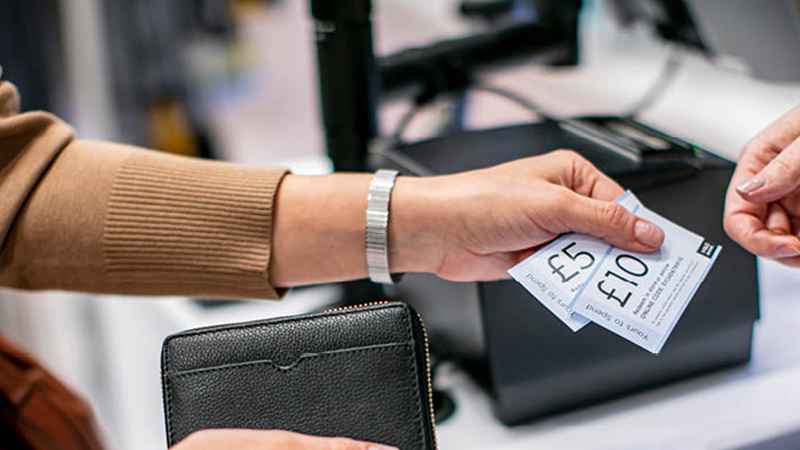What is a credit card?
Put simply, credit is when you borrow a sum of money that you must pay back at a later date.
Credit cards can give you the flexibility to cover surprise costs that come your way – such as plumbing problems or car repairs – should the unexpected happen. Or, you can use a credit card to treat yourself to that special something you've had your eye on.
However you use it, when used responsibly a credit card allows you to spread the cost of your purchases over time, making flexible and convenient repayments based on the amount you choose to repay each month (as long as it's at least your minimum monthly payment).
Credit cards explained
Once you take out a credit card, you can start to make purchases within your agreed credit limit. Then, you need to make regular payments (or one larger payment) to pay off the balance.
So what makes a credit card different to a loan? Besides varying levels of interest, fees and rewards, each type of borrowing is structured a little differently.
A credit card is a form of revolving credit, which means you can borrow money up to the amount of your credit limit, repay some (or all) of the balance, then borrow again if you wish. You'll normally pay interest on each transaction from the date it's added to your account, until it's repaid.
A personal loan is a little more structured. You'll usually borrow a lump sum, then repay it in equal instalments over a set period of time – with interest added to your repayments.
What is APR on credit cards?
APR stands for annual percentage rate. This is the standard way of showing the cost of borrowing over a year, taking into account the interest that's applied to the money you borrow with your credit card that you'll pay back on top of your balance over the course of the year and any other charges you have to pay for having the card (such as an annual fee).
It's a legal requirement for the APR to be shown on credit cards and loans, so you shouldn't get any unpleasant surprises. But it's important to keep in mind that not everyone will receive the representative APR, which is the APR the provider expects at least 51% of applicants successfully applying for the product as a result of the promotion showing the representative rate to be offered. You'll find out the exact APR you'll pay if your application is approved.
How is your credit card minimum payment calculated?
A minimum payment is the smallest amount of your total credit card balance that you need to repay each month. With a credit card from M&S Bank, we'll send you a statement each month showing the minimum payment for that month.
Your minimum payment will be whichever of the following amounts is higher:
- The sum of – interest for the period from the last statement, any default charges, and 1% of the full amount you owe as shown on your monthly statement (not including interest and default charges).
- 2.5% of the full amount you owe as shown on your monthly statement (including interest and charges).
- £5.
For example, if the amount you owe is £450 including £15 interest and £12 charges then, using the information above:
- Would be £31.23. The total would be the highest and would be your minimum payment. Split out according to the above this is – £15 interest, £12 charges and £4.23 (1% of the amount you owe) = £31.23.
- would be £11.25 (2.5% of £450).
- £5, or if you owe less than £5 you must pay the full amount you owe (e.g. if you owe £2.50 that will be the minimum payment).
For more information on your minimum payment and how it's calculated, please check the terms of your Credit Card agreement.
For Credit Card agreements made before 23 March 2011, your minimum payment will be 2.5% of the balance, or £5 per month – whichever is higher.
You can make your minimum payment using internet banking, by phone, cheque, via Direct Debit or at most checkouts in M&S stores – however you find easiest. It's always best to pay more than the minimum payment where you can - if you only ever make the minimum payment, it'll take you longer to clear your balance and may cost you more in interest. Paying your balance off in full each month may mean that you don't pay any interest.
To learn more about the number of ways you can pay your M&S Credit Card, visit ways to pay to find out more.
How can I get a credit card?
If you've not had a credit card before, the idea of setting one up might seem complicated but the process is actually quite straightforward. First, you'll need to provide some basic information to check you're eligible. Our online eligibility checker will give you an idea of whether you'll be accepted for an M&S Credit Card, without affecting your credit score.
Interested in applying for a credit card? You can find out more about the credit cards we offer by visiting our credit card offers page.
Advantages of a credit card
Unsure whether a credit card is for you? Using a credit card can allow you to:
Enjoy peace of mind
Consumer security systems monitor your credit card and protect you against fraudulent purchases should your card be lost or stolen. Another potential benefit to paying using your credit card is that if you have a problem with a purchase, you may be protected under section 75 of the Consumer Credit Act. This covers purchases made between £100 and £30,000 and means that credit card providers are equally liable if something goes wrong with a supplier.
Enjoy a 0% interest period on purchases
If paid off on time, credit cards can be a great way to borrow money. With M&S Bank, you could enjoy a period of 0% interest on purchases, the length of which will depend on the credit card offer you apply and are accepted for.
Don't forget to make at least your minimum payments on time to keep your promotional rate and save on interest.
Build your credit score
By maintaining monthly repayments on a credit card, you can build a credit score which may prove to lenders that you're a reliable borrower. This could help you in the future when applying for a mortgage to buy a house or a loan for car purchase, for example – plus, you may get access to better interest rates when you do. Just remember that your credit score could be harmed if you don't make payments on time and stay within your credit limit.
Be rewarded
There could be great benefits to using your credit card to make purchases – at M&S Bank, you'll earn reward points on all of your spending which we'll convert into M&S vouchers for you to spend in store or online at M&S. You may also receive bonus points offers at different times during the year. Take a look at our credit card rewards page for more information.
Choose the right card for you
Different credit cards offer different benefits so you can choose a card that suits your personal requirements. Consider how you plan to use a credit card and pick the card that best meets your needs.
Make payments in over 43 million outlets worldwide
Some companies – like car rentals and hotels – will only let you pay using a credit card, for their own peace of mind. With an M&S Credit Card, you can shop with confidence wherever you see the Mastercard logo, worldwide.
What’s a representative example?
When you see representative example on our credit card offers, it will give you an understanding of how much it can cost if you borrowed £1,200 in one year.
This is what a representative example looks like:
Representative example
24.9% Purchase rate p.a. (variable)
24.9% APR Representative (variable)
£1,200 Assumed credit limit



